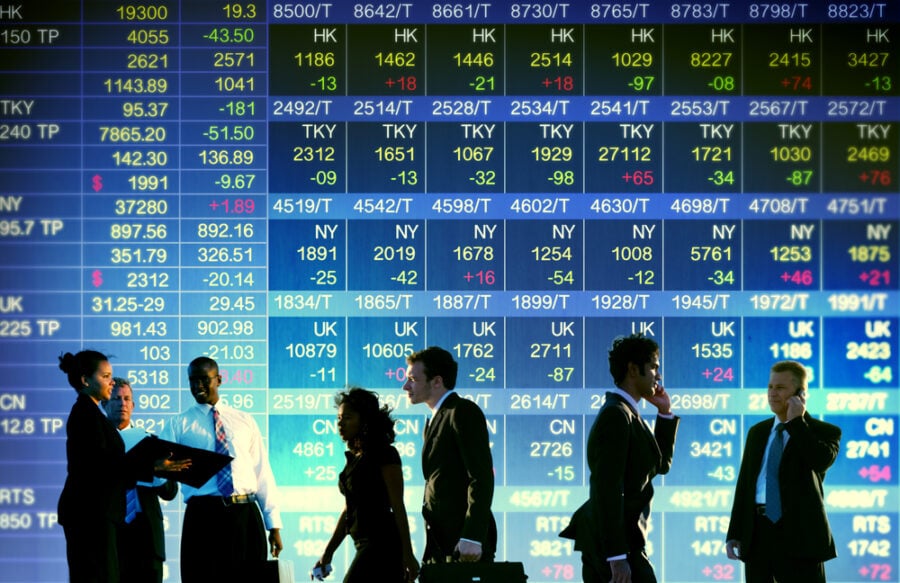The Institute of International Finance (IIF) lowered its forecast for the global economy this year as a result of the war in Ukraine, and uncertainty about China’s growth, due shutdowns aimed at fighting the omicron mutant. IIF, however, expected “a return to strong growth and large current account surpluses in the Middle East, and anticipated the current account surplus for the MENA to rise to $400 billion this year from $120 billion in 2021.”
In its latest report issued yesterday, the institute said that “usually this report coincides with another issued by the International Monetary Fund on the global economic outlook, but the Russian invasion of Ukraine caused a delay in the release of the report for one month due to the uncertainty.
It explained that “the presence of all these shocks threatens the global economy and increases the risks of recession.”
The global economy is now expected to grow by 2.3 percent in 2022, compared to a previous estimate of 4.6 percent.
The IMF lowered in April its growth forecast for the global economy this year to 3.6 percent, due to the Russian war in Ukraine and high inflation fueled by high commodity prices.
“Our growth cuts are most notably the eurozone, emerging Europe and China… the rest of the world is affected somewhat less, given the positive effects of terms of trade – particularly in commodity-exporting Latin America – and less important trade links with Russia and Ukraine,” the IIF said.
“The risks to our outlook tilt to the downside as markets are taking an increasingly bleak view of central bank policy normalization,” it added.
The United States, the world’s largest economy, is set to grow 2.5 percent this year, down from 5.7 percent in 2021 as the country’s central bank continues to tighten monetary policy and raise interest rates.
Growth in China, the world’s second-largest economy, has fallen to 3.5 percent this year from 5.1 percent. The IIF said that this largely reflects the problems plaguing the country’s real estate sector and the effects of renewed lockdowns which are likely to cause the economy to contract in the second quarter.
“The Omicron wave in China is more turbulent than we expected and will significantly impact growth and capital flows,” IIF said.
China’s “Zero Covid” policy has also caused industrial production and consumer spending to fall to their worst levels since the health crisis began.
Industrial output fell by 2.9 percent in April compared to last year, while retail sales shrank by 11.1 percent in this period, while unemployment jumped to 6.1 percent.
As a result of the Russian war in Ukraine, now in its fourth month, the IIF has lowered its forecast for eurozone growth this year to 1 percent from a previous estimate of 3 percent.
“This is a sign of recession,” the IIF commented.
Energy
And the risk of energy wars between Russia and Europe will keep natural gas prices high.
“We are concerned about global food security with global food prices at their highest levels in several decades. Russia has banned exports of grain and sugar, and Ukraine, one of the largest exporters of important staple foods, could be affected by the sowing and harvesting season as a result of war.”
Middle East Region
In the Middle East, the institute said it saw “a return to strong growth and large current account surpluses” with “a certain degree of flexibility” for oil-exporting countries despite the challenging global growth environment.
The current account surplus for the MENA region is expected to rise to $400 billion this year from $120 billion in 2021, With the Gulf Cooperation Council countries acquiring 90 percent of the total volume on the back of high oil prices, which have risen by more than 60 percent since last year.
Growth in Saudi Arabia, the world’s largest energy exporter, is expected to reach 7.2 percent this year.
The IIF said capital flows to emerging markets are likely to weaken significantly due to the rising risks of a global recession.
The institute expects non-resident flows to emerging market countries, excluding China, to fall to $645 billion in 2022 from about $1 trillion last year, while it expects recent outflows to continue in China.
“Overall, we expect global GDP to decline mainly this year…a large part of the negative drag is coming from Russia and Ukraine, where activity is collapsing,” it added. “However, apart from these two countries, the vulnerability is widespread and leaves little margin for error.”








